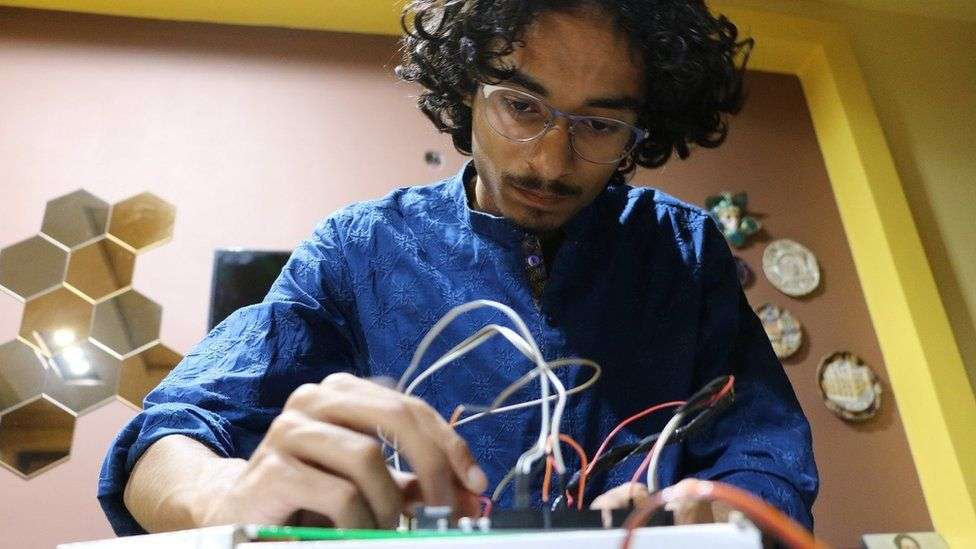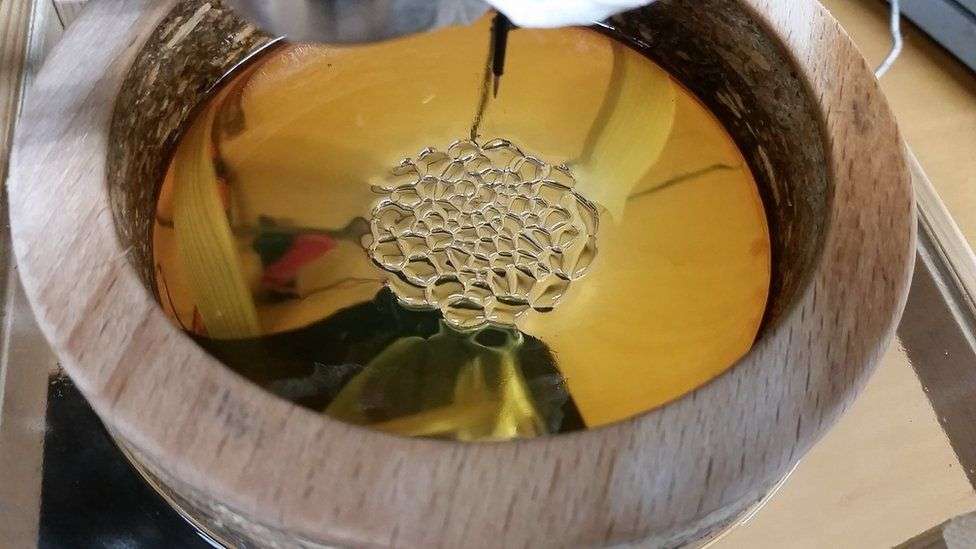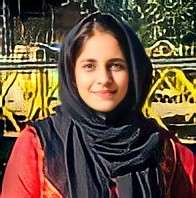Muhammad Shaheer Niazi is a 20-year-old experimental Pakistani armature scientist. At the age of 16 he found a way to photograph the movement of ions that form the honeycomb shape made when electrically charged particles try to pass through a pool of oil. The resulting shape is also known to scientists as Rose window instability. His research was sparked by his participation in the International Young Physicist Tournament in Russia in 2016, as one of Pakistan’s first participants. The results of Shaheer research were subsequently published in the Royal Open Science Journal.

Iqra Aslam: How did you get interested in the field of science, especially, Physics?
At a young age, my parents would show me documentaries about space and science during our leisure time. My grandfather and father, both avid science enthusiasts, would tell me many exciting things, which led me to experiment using whatever I could find at home. Like electrolysis, double slit experiment. I wanted to conduct even more investigations and understand the rare phenomenon of nature, which led to my pursuing of physics.
Iqra Aslam: Please tell us about your educational background and which institute you are currently linked with.
Iqra Aslam: How did you find a way to participate in International Young Physicists' tournament, and what was it about?
My mother showed me their website and asked me to participate. We found a professor in COMSATs, Dr. Farida, who agreed to coach us and formed an official team. IYPT is known as the physics world cup. 17 problems are given to groups, out of which they research a select few, forming a presentation thesis. The thesis is debated in a 3-team format with opposition and a reviewer. Judges then score each team.
Iqra Aslam: You became famous for your groundbreaking research on electric honeycombs. What led you to experiment with an electric honeycomb? How is it formed? Please tell us the idea of this experiment and how it is essential in physics.
I have a deep interest in electrical phenomena. So when I saw this problem in the problem set of IYPT, I knew it was the one for me. A high-voltage needle electrode applies a high-voltage electric field on an oil surface. The field and ions produced by the high voltage cause a charge on the dielectric oil surface which doesn’t conduct. A pattern is formed in the oil for the ions to pass through, which lets the ions regain electrons by getting grounded. I investigated the cause of the way and introduced new parameters which influenced the phenomena. It has no practical benefit as of now, but it can be used in the future.


Iqra Aslam: It must be an honor to get acknowledged internationally at such a young age. What motivated you to go the extra mile and get your paper published in the Royal Society of Open Science?
Once again, my mother gave me the idea and motivation to publish my research. She suggested I save my time and make it fruitful by publishing.
Iqra Aslam: How difficult was it to get your paper published in a famous journal at a very young age?
Publishing is a long and challenging process. I received a few rejections early, after which I improved my research and tried again with better novelty. However, it took me 1.5 years to get it published (The Electric Honeycomb; An investigation of rose window instability).
Iqra Aslam: You broke the record of Newton and published your work earlier than him. When did you get the idea that your work is being recognized worldwide, and how does it feel to be among the league of scientists?
A journalist from the New York Times covered my article, as the journal releases a press release to journalists for recent articles to cover. This then led to the news getting famous all over the world. She was unaware that I was 16 at the time and referred to me as Dr Niazi. I can’t still be worthy of being among the league of scientists as I have a long way to go and a lot to learn.
Iqra Aslam: What has been your experience working with different research communities, especially in Pakistan?
There is a lot of work behind the scenes that rarely makes it to the media. So people have the idea that there is very little science going on, but once in the right places, there is a whole world of science in Pakistan. I’ve worked in molecular biology labs and physics ones in different areas. They are always very well equipped and high quality.
Iqra Aslam: Your profile shows a deep interest in space science. What are your recent projects in the science field? Should we expect any big news coming from your side again?
I can’t disclose my current projects haha, but many exciting things are coming.
Iqra Aslam: What is your comment on the conventional schooling and infrastructure of educational sectors, especially in developing countries like Pakistan, where there are no strong roots?
Schooling will always never be good enough for anything. It is a self-study that enhances one’s knowledge and can lead to great things. It is common knowledge that our system is terrible, but there is nothing we can do other than focus on ourselves.
Iqra Aslam: How would you describe yourself, and what are your future goals?
I am an experimental physicist who likes history, art and nature. I consider myself a multidimensional person, a valuable trait for people in science. My goals are to continue research and studies. PhD and hopefully make a breakthrough discovery and earn Pakistan a Nobel Prize.

Iqra Aslam
Iqra Aslam is Assistant Director of SkyVerse Magazine. She is also the associate editor of Scientific Ravi magazine and co-author of the PM series. She is pursuing a Bachelor of Science in Physics at the Government College University, Lahore.
He is good motivation for young physicists to develop interest in physics and do something extra ordinary in this branch. Thanks iqra for this content, you always comes with amazing knowledge.